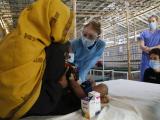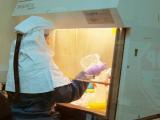Feb 24, 2003 (CIDRAP News) The US Department of Homeland Security (DHS) is using an advertising campaign to urge Americans to store emergency supplies and take other steps to prepare for potential terrorist attacks, including biological and chemical attacks.
The public service campaign includes a new Web site, www.ready.gov, along with television, radio, print, and outdoor advertising, DHS officials said last week. The effort will also include mail brochures and messages in telephone directory yellow pages, among other measures. The ads advise people to get preparedness information from the Web site or by calling 1-800-BE-READY for a free brochure.
"Stash away duct tape and pre-measured plastic sheeting for future use," DHS said in a Feb 19 news release. "Experts tell us that a safe room inside your house or apartment can help protect you from airborne contaminants for approximately five hoursthat could be just enough time for a chemical agent to blow away."
The messages advise citizens to keep a 3-day supply of nonperishable food and water in case an attack closes roads and knocks out power and water supplies. "Add flashlights and a battery-powered radio to hear the latest instructions from local authorities," the DHS release says. "Don't forget extra batteries, a blanket, a first aid kit and medicines, and a manual can opener."
DHS officials also suggest that family members know how to get in touch with each other and have an emergency plan for different types of attacks. "Choose a meeting place, maybe a friend or relative's house, that's well away from your neighborhood," they add. "Keep your gas tank half-full. And always make sure you have a set of emergency and contact numbers posted by the phone."
The new Web site includes pages of tips on emergency kits and planning and general information about biological, chemical, radiological, and conventional bomb threats. The section on biological threats states, for example, "At the time of a declared biological emergency, if a family member becomes sick, it is important to be suspicious. Do not automatically assume, however, that you should go to a hospital emergency room or that any illness is the result of the biological attack. Symptoms of many common illnesses overlap. Use common sense, practice good hygiene and cleanliness to avoid spreading germs, and seek medical advice."



















